Discover practical strategies for cleaning your garage floor effectively without the need for a pressure washer.
Cleaning a garage floor without a pressure washer is entirely possible and can be accomplished with a few simple steps. This process involves using common household products or commercial cleaners, a stiff-bristled broom, and some good old-fashioned elbow grease.
In this article, you’ll find a detailed guide on how to effectively clean your garage floor, removing even the toughest stains like oil and grease, without the need for a pressure washer. Stick around to learn some practical tips and tricks that will leave your garage floor spotless and in pristine condition.
Key takeaways:
- Use stiff-bristled broom and dustpan to remove debris
- Adjust cleaning method based on stain type (oil, rust, tire marks)
- Degreasing solution for oil stains, concrete cleaner for tire marks
- Apply cleaning solutions and scrub with a stiff-bristled broom
- Consider sealing garage floor for easier maintenance and protection
Necessary Cleaning Tools and Equipment
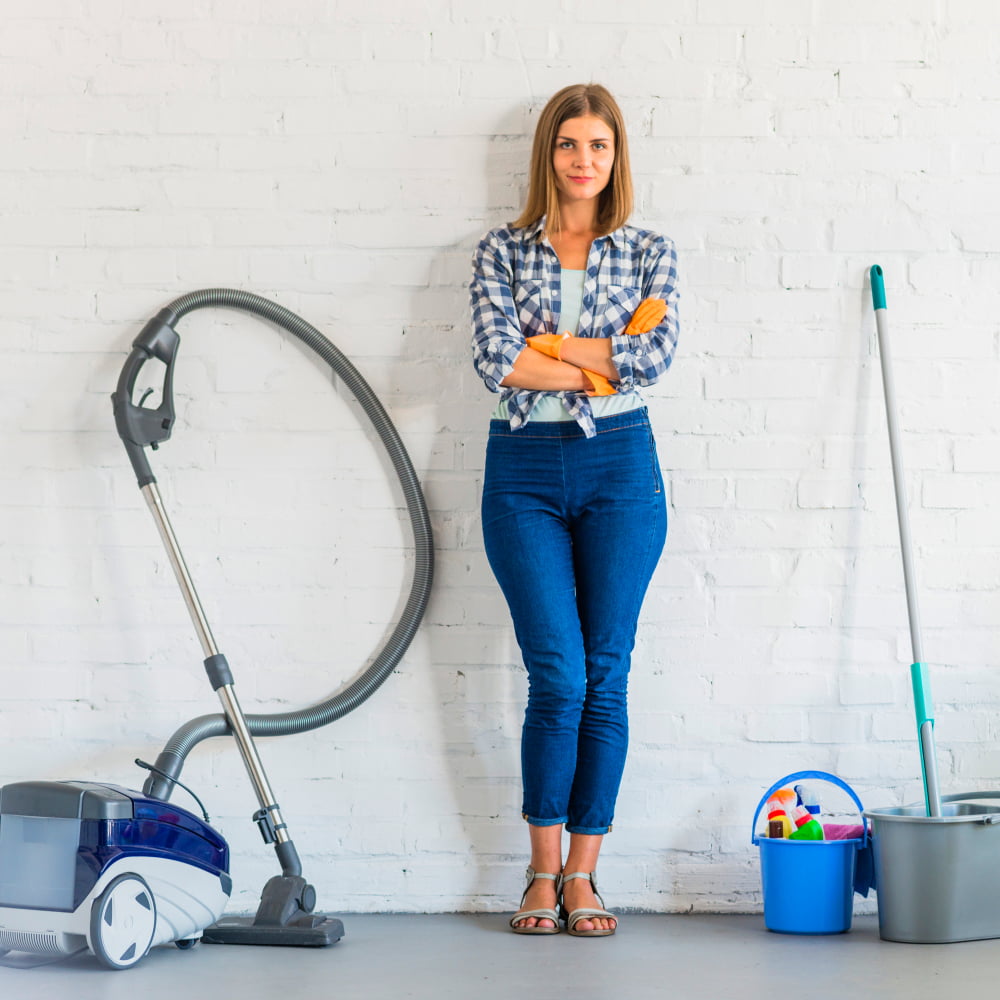
Equipping yourself with the right tools makes cleaning the garage floor a straightforward task. At the most basic level, you’ll need a stiff-bristled broom or brush and a dustpan to sweep away dry debris. Depending on stain types, a scrape or wire brush might be useful for tougher, dried-on substances.
For overall cleaning, a regular mop and bucket are essential, along with a couple of robust rags to soak up excess moisture. Finally, consider getting absorbent materials likes cat litter or cornmeal, as these can help in absorbing oil and grease spills prior to cleaning.
Type of Stains Commonly Found On Garage Floors
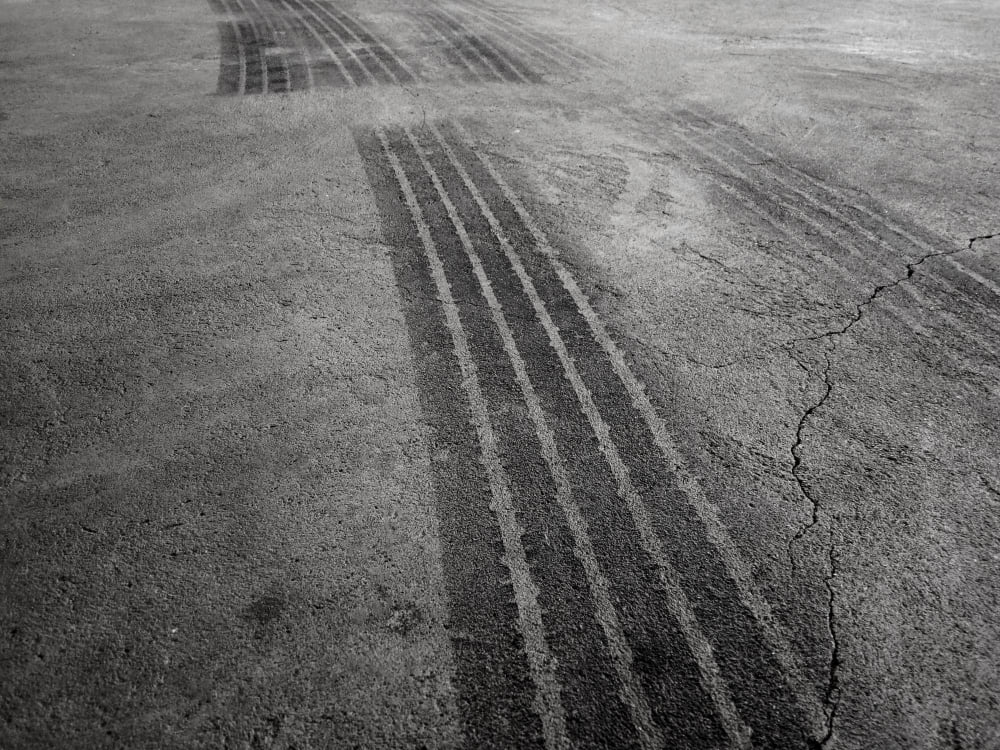
Motor oil, rust, and tire marks are routinely found splotching garage floors, each with their unique cleaning requirements. The vehicle you house in your garage often leaves behind oil drips. These are stubborn and persistent, requiring a degreaser for effective removal.
Similarly, metal items stored or moved around might cause rust stains. These are generally removed with specific rust-removal cleaners or household items like vinegar.
Finally, the unsightly tire marks. Frequently caused by hot tires on an epoxy-coated floor, these can be stubborn but are often removable with soap and water, or, in severe cases, a solvent. Keeping these types of stains in mind will help you select the right cleaning approach.
Effective Cleaning Agents for Garage Floors
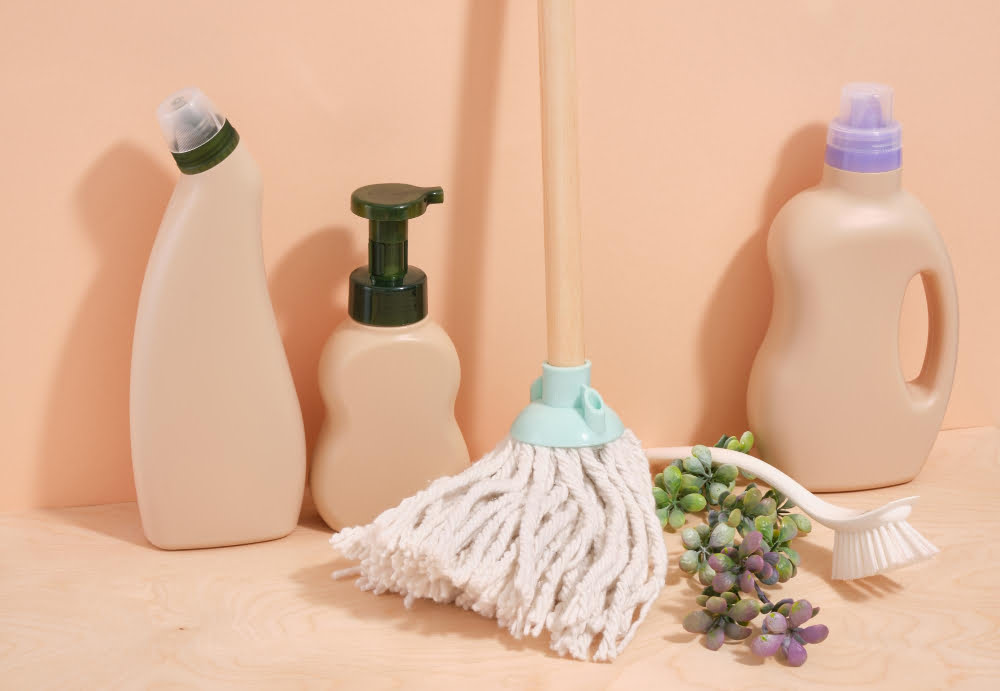
A variety of cleaning solutions are suited for de-staining a garage floor. For oil spots, consider a degreasing solution such as dish soap or a commercial degreaser. Mop up the solution with warm water for optimal results. Alternatively, baking soda or cat litter can absorb oil stains when left overnight.
For tire marks, a concrete cleaner or degreaser could do the trick. Mix it with warm water following the manufacturer’s instructions. Then scrub the floor with a stiff-bristled broom.
If dealing with rust stains, household items like lemon juice or vinegar prove effective. Apply directly on the rust and let it sit for about 15 minutes, then scrub it off.
Remember to always mop the floor with clean water to rinse off the solution, and let it dry thoroughly. Avoid chlorine-based bleach as it can damage the concrete over time. Always test a small, less noticeable spot first to ensure the cleaner doesn’t cause discoloration or other damage.
Step By Step Process for Cleaning Garage Floors
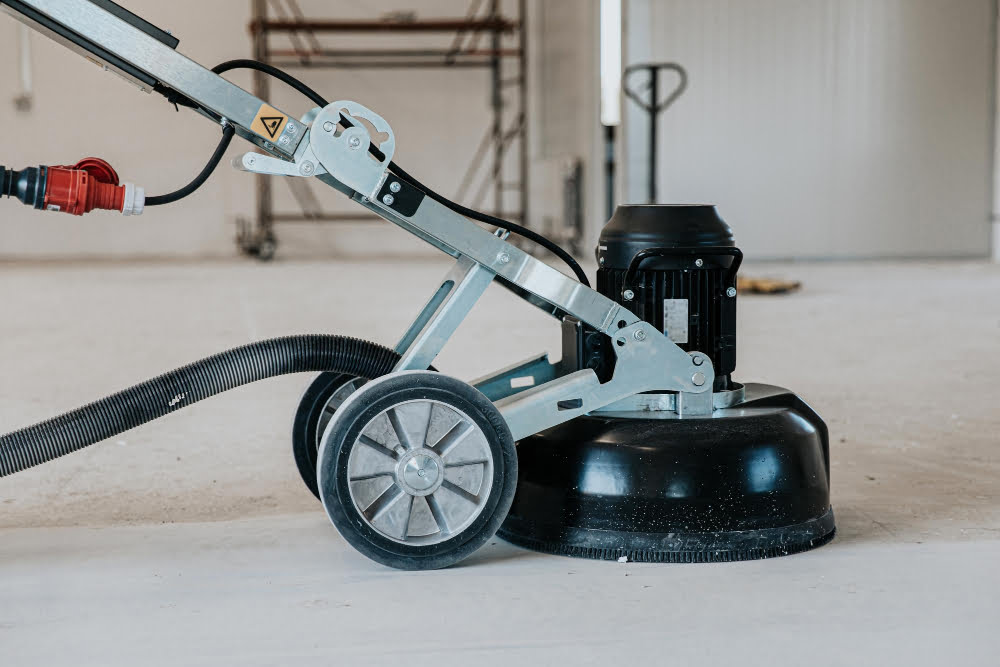
To begin, sweep or vacuum the garage floor to remove dust, debris, or loose particles. This acts as a preliminary step, ensuring a clean base to work with.
Afterwards, select an appropriate cleaning agent based on the type of stain. For oil stains, use a degreaser, while for general stains, a simple dish soap solution is sufficient. Apply the detergent, and let it sit for around 15 minutes. This allows the cleaner to penetrate and loosen the stains.
Once the cleaner has done its job, use a long-handled scrub brush to work the solution into the floor. Use small, circular motions, applying a decent amount of pressure. Concentrate on one area at a time for an efficient cleaning.
After scrubbing, it’s time to rinse. Use a high-quality garden hose with a spray attachment to flush away the soap and loosened grime. Take caution not to use too much water to prevent it from seeping into any uncovered areas.
Lastly, allow the floor to dry naturally. If you’re in a hurry, use a squeegee to push excess water out the door. A periodic clean like this can save you thousands of dollars in major repair and replacement costs.
Overall, cleaning your garage floor is a relatively simple task, even without the use of a pressure washer. The process just requires a bit of elbow grease, time, and the appropriate cleaning agents.
Preventive Measures to Avoid Stubborn Garage Floor Stains
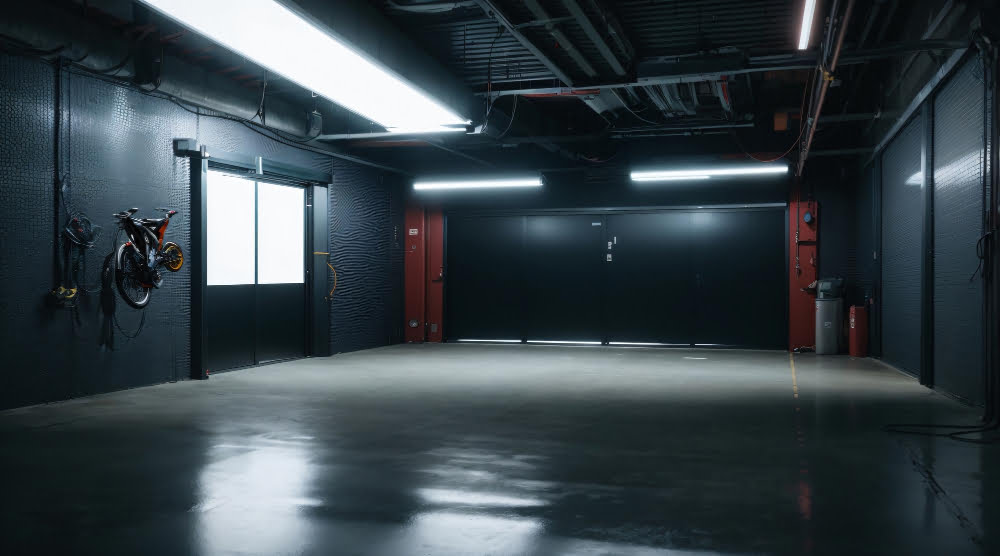
To keep your workspace pristine, it’s best to be proactive. Spills and drops are inevitable, but their long-term effects can be minimized. If a mishap occurs, quick action is key. Dab liquids with a cloth or absorbent material to prevent seeping. Avoid rubbing as it can spread the stain area.
Avoid using corrosive chemicals without a catch basin or protective mat. These can mar the floor with stains or cause etching. Also, when working on projects that involve elements like paints, oils, or varnishes that may splatter, use drop cloths or mats for protection.
Regular sweeping or vacuuming can keep dirt, debris, or other abrasive materials from scratching your floor and embedding into any existing cracks. Ensuring the garage is ventilated correctly will reduce moisture that can promote mold growth and affect the floor’s integrity.
Tire tractions especially in snowy or muddy conditions can leave residues that dry and stick onto the floor’s surface. To remedy this, a simple routine of using a stiff bristle broom to brush out tire tracks can make a difference.
By applying these preventive steps, maintaining a clean garage floor is achievable and will prolong its life and aesthetics.
Considerations When Cleaning the Garage Floor
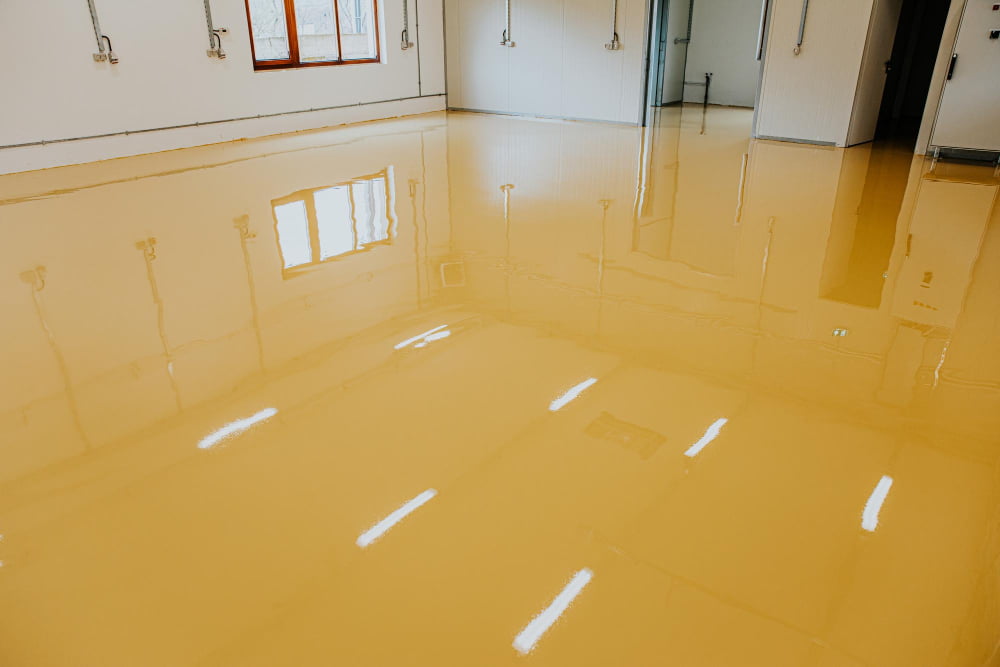
It’s crucial to think about the nature of the stain. Oil and grease stains, for example, may necessitate different treatments than rust or paint. Furthermore, prior application of sealants or epoxies may affect the cleaning process. Hence, know your garage floor.
Safety is of equal importance too. Some cleaning agents emit strong fumes which could be detrimental to health if inhaled in an enclosed space like a garage. Ensure there’s ample ventilation, and don appropriate protective gear such as gloves and goggles. Also, dispose of any cleaning waste responsibly to avoid environmental hazards.
Think about time and effort. Some cleaning methods are more labor-intensive than others. The cleaner, stain severity, and amount of elbow grease you’re willing to put in will factor into your approach.
Finally, consider the desired outcome. If you’re preparing the floor for a new coating, you might need to be extra diligent in your cleaning. Otherwise, you may be able to get by with less thorough methods.
Sealing the Garage Floor for Easier Maintenance
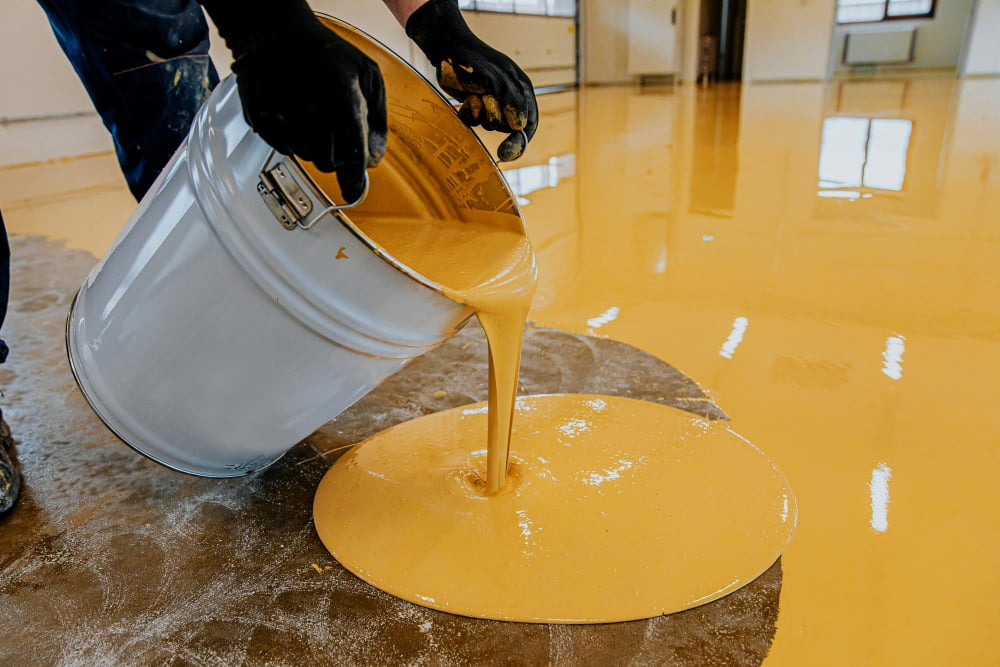
Once your garage floor is gleaming clean, the next smart move is to seal it. Sealing not only affords your floor a polished look, but it also offers protection from future stains and damages. Here are key points to consider:
1. Select a Sealer: Choices range from acrylic and epoxy to polyurethane. Acrylics are cost-effective and easy to apply, yet they may not be as durable. Epoxy offers a balance between affordability and durability, while polyurethane is pricey but provides superior protection.
2. Equipment: A roller, extension pole or paintbrush is typically used for application. Protective clothing and eyewear are also beneficial to guard against spills and splashes.
3. Preparation: Ensure the floor is clean, dry, and free from debris. Any existing stains or paint must be removed for the sealer to adhere properly.
4. Application: Follow the manufacturer’s instructions. Typically, start from the corner away from the exit, working in small sections till the entire floor is covered.
5. Drying Time: Allow the sealer to dry completely before using the garage. This may range anywhere from 24 to 72 hours based on the product used.
By sealing the floor, overall garage maintenance becomes considerably easier and the lifespan of the garage floor is significantly extended. Remember to reapply the sealer as per the manufacturer’s recommendation to keep your garage floor at its best.
FAQ
How do you clean a garage floor without a hose?
To clean a garage floor without a hose, combine a half cup of baking soda with a gallon of warm water, or create a paste with baking soda and a few drops of liquid soap, using these mixtures to scrub away light stains and maintain cleanliness.
Can I use Dawn to clean my garage floor?
Yes, you can use Dawn dish soap to clean your garage floor, letting it sit for a few minutes before using a pressure washer or a nylon brush for stubborn spots.
What is the best thing to clean concrete floors with?
The ideal method to clean concrete floors is by using a mix of suitable cleaners such as Castile soap, liquid dish detergent, stone cleaners, or mild floor cleaners, applying the solution with a wet mop, and then rinsing it off using a mop dipped in clean water.
What are some effective homemade solutions for cleaning concrete garage floors?
A mixture of baking soda and warm water can effectively clean concrete garage floors.
How can broom cleaning be optimized for a thorough garage floor cleanup?
Broom cleaning for a thorough garage floor cleanup can be optimized by sweeping in one direction to prevent dust clouds, using an angled broom for corners and edges, and finishing with a dust mop for smaller particles.
Is using a dry vacuum cleaner an effective method for cleaning garage floors?
Yes, using a dry vacuum cleaner is an effective method for cleaning garage floors as it can easily pick up dust, dirt, and small debris.